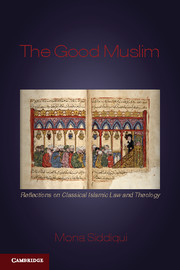Book contents
- Frontmatter
- Contents
- Acknowledgements
- Introduction
- 1 Spoken, Intended, and Problematic Divorce in Hanafī Fiqh
- 2 Between Person and Property: Slavery in Qudūrī’s Mukhtaṣar
- 3 Pig, Purity, and Permission in Mālikī Slaughter
- 4 Drinking and Drunkenness in Ibn Rushd
- 5 Islamic and Other Perspectives on Evil
- 6 The Language of Love in the Qur’ān
- 7 Virtue and Limits in the Ethics of Friendship
- Glossary
- Bibliography
- Index
- References
3 - Pig, Purity, and Permission in Mālikī Slaughter
Published online by Cambridge University Press: 05 July 2012
- Frontmatter
- Contents
- Acknowledgements
- Introduction
- 1 Spoken, Intended, and Problematic Divorce in Hanafī Fiqh
- 2 Between Person and Property: Slavery in Qudūrī’s Mukhtaṣar
- 3 Pig, Purity, and Permission in Mālikī Slaughter
- 4 Drinking and Drunkenness in Ibn Rushd
- 5 Islamic and Other Perspectives on Evil
- 6 The Language of Love in the Qur’ān
- 7 Virtue and Limits in the Ethics of Friendship
- Glossary
- Bibliography
- Index
- References
Summary
It is impossible for persons of culture to keep the Dietary Laws.
C. G. MontefioreSeveral years ago a retired academic and Church minister at Glasgow University stood next to me in line for a morning coffee in the University’s canteen. It was around 8.30 a.m. and the canteen was busy serving breakfast. We were both familiar faces at that time of the morning, but on this occasion he came up to me with his breakfast on his tray and said with a smile, ‘Mona, I could never convert to being a Muslim, I would miss my bacon butties too much.’ This gentleman, like many people in the West, was aware that Muslims generally observed the scriptural prohibition on eating pig meat but could not quite understand why. Indeed, he found it faintly amusing that worship of God could be reduced to a particular focus on dietary prohibitions, especially in relation to such succulent animals like the pig. But even after a brief conversation in which I tried to explain the issue of slaughter requirements in general and not just the prohibition on pig meat, he found it difficult to understand from his Christian perspective how dietary laws could continue to have any spiritual or indeed meaningful relevance in today’s society. In man’s relationship with God, surely there other more important ethical issues to be observed than the meat that one ate? It begged the larger question as to whether Muslims think of the transcendent and connect with the sacred primarily through the observance of certain rituals and obedience to certain laws.
Recently, an American Muslim colleague of mine, observing that I was scrutinising the fish and vegetarian dishes in a restaurant menu, asked me why I did not want to order a meat dish. In my response to him that I only ever ate meat that I knew to be ḥalāl, he looked puzzled and said, ‘Why are you making this an unnecessary problem for yourself? Just say “Bismillah” over the food and eat it.’
- Type
- Chapter
- Information
- The Good MuslimReflections on Classical Islamic Law and Theology, pp. 67 - 89Publisher: Cambridge University PressPrint publication year: 2012



